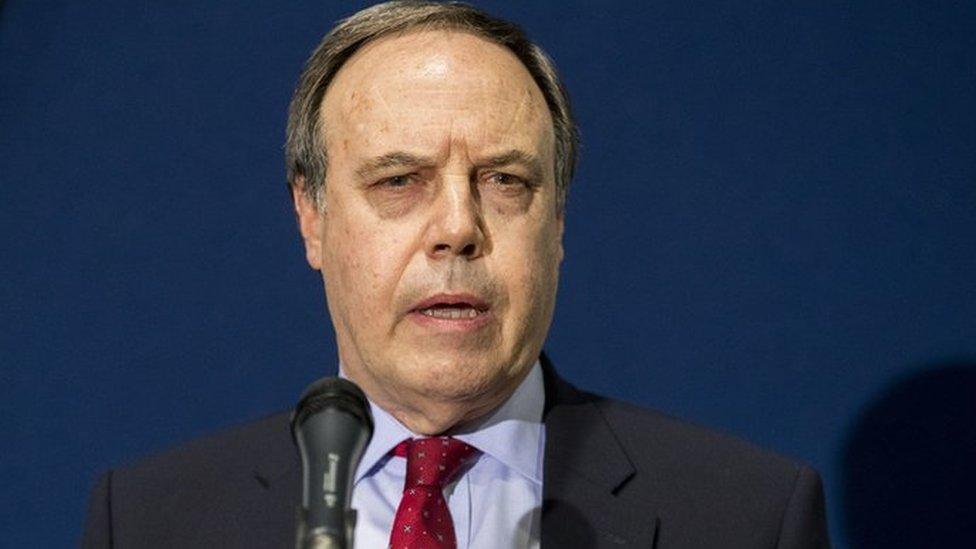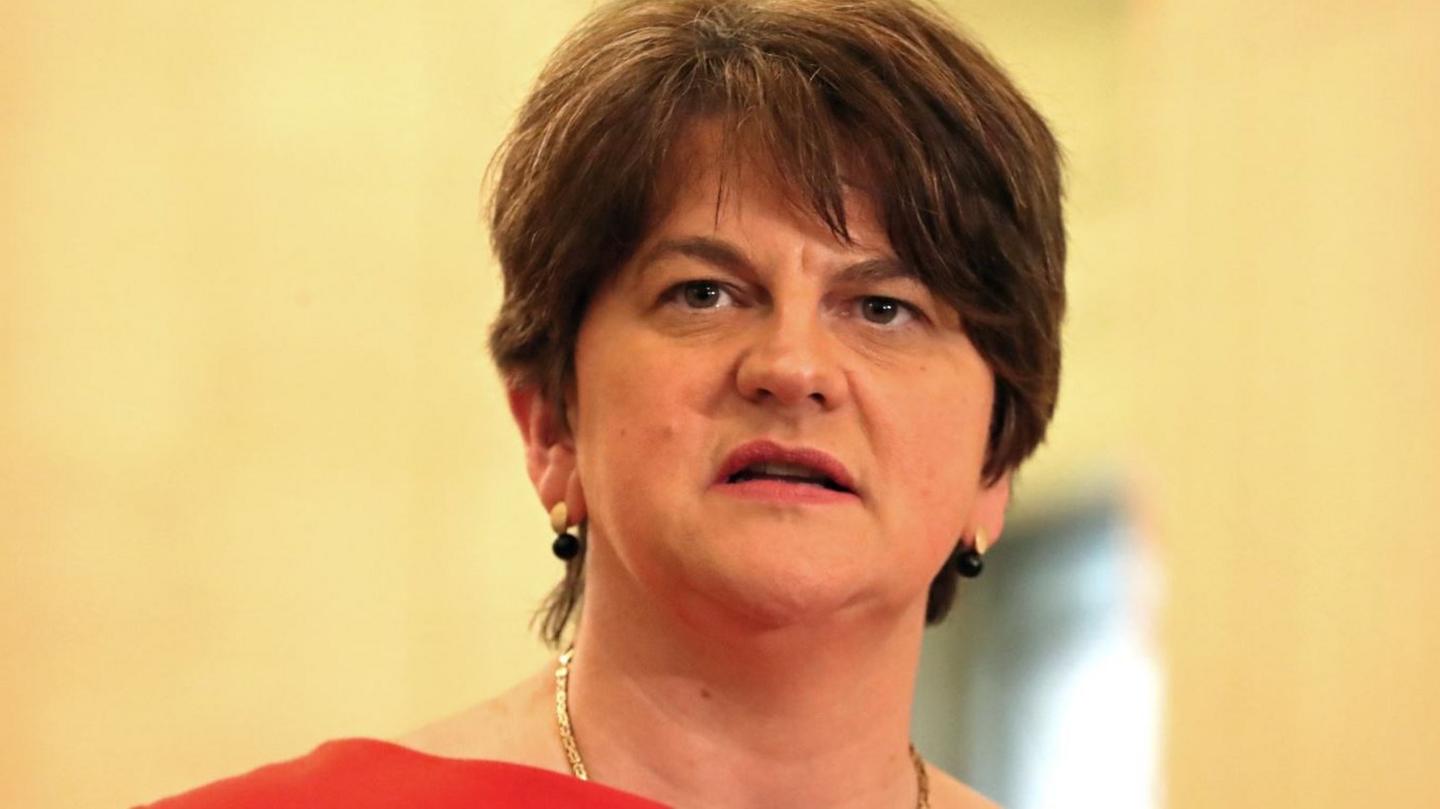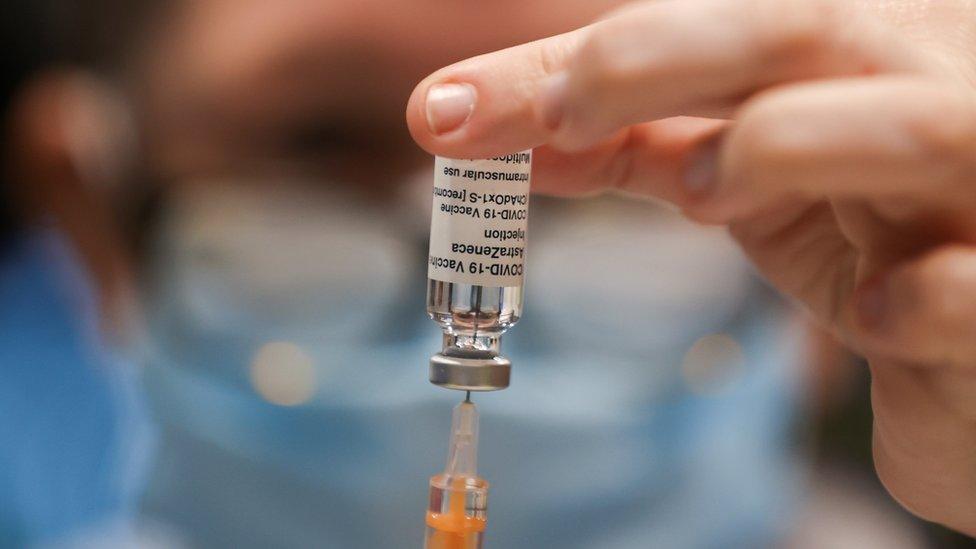Covid: 'EU's mask slipped' over vaccine export row
- Published

Nigel Dodds said people were "bewildered" by the EU's move
The EU's mask "slipped" over its move to trigger Brexit measures to control the export of coronavirus vaccines from the EU into NI, Nigel Dodds has said.
The DUP deputy leader said the bloc had lectured against a hard border on the island of Ireland, then in one "swoop" they were prepared to put one in force.
Brussels has since reversed the decision, which could have seen checks on the Irish border.
Taoiseach (Irish PM) Micheál Martin has called for calm following the row.
The EU's threat to invoke a clause in the NI Protocol came amid vaccine shortages in the bloc and there were concerns the Irish border could be used as a backdoor for supplies entering the UK.
The protocol, which is part of the Brexit Withdrawal Agreement, is designed to allow the free movement of goods from the EU into NI, and prevent the need for a hard border on the island of Ireland.
Mr Dodds told BBC News NI's Sunday Politics show that people were "outraged" and "bewildered" by the EU's move.
"What the EU has now effectively done is set a precedent," he said.
"In circumstances where the single market is in danger and there's a potential threat, the provisions of Article 16 can be triggered."
On Saturday, Democratic Unionist Party (DUP) leader Arlene Foster called for the protocol to be replaced due to trade flow problems between GB and Northern Ireland, and Mr Dodds repeated that assertion.
"The British government now has the opportunity to look at what the problems are between Great Britain and Northern Ireland, the societal difficulties and economic difficulties," he said.


The DUP called for London to step up and instead it stepped back.
For Arlene Foster it was an "act of hostility", for Michael Gove it was a "mistake"
Two very different assessments of the EU's move to trigger Article 16 on Friday.
Instead of striking back and triggering Article 16 to deal with the trade flow problems across the Irish sea border as demanded by the DUP, London has opted to smooth the waters and bank any negotiating capital it may have gained from the Brussels backtrack.
It is clear Boris Johnson will pick and choose his battles with Brussels carefully and going to war over the Northern Ireland protocol is not yet on his radar.
But he may now seek more flexibility from a battered and bruised Brussels over how the protocol is operating.
London wants to "reset" its relationship with the EU; resetting its relationship with the DUP may be a little more complicated.

Taoiseach Micheál Martin said he was given no advance notice of the intention by the EU to trigger Article 16 of the NI Protocol.
However, he disagreed with the assessment of First Minister Arlene Foster that the EU displayed an "act of hostility" on Friday evening by triggering the emergency clause.
He says an "acrimonious row" between pharmaceutical firm AstraZeneca and the EU over vaccine supply took centre stage and there were "a lot of lessons to be learnt" from the incident.
Taoiseach Micheál Martin told the BBC's Andrew Marr that the EU was "blindsided" by the AstraZeneca vaccine row
He also told the BBC's Andrew Marr Show that issues related to the protocol needed "fine-tuning".
"It's a good thing, the protocol, overall," he said.
"We are only four weeks into the operation of the protocol, there are bound to be teething problems but I do acknowledge the need for engagement here on all sides, between the European Union, the United Kingdom and the Irish Government, and the Northern Ireland Executive."
Conservative MP Simon Hoare said there was "no appetite in Westminster to ditch the protocol".
Mr Hoare, who is the chair of the Northern Ireland Affairs Committee, said: "It would be disastrous to do so.
"The events of Friday illustrated, maybe helpfully in the short-to-medium term, is that we need to have some clarity with regards to what the circumstances are which would allow Article 16 to be triggered."
Former UK Prime Minister Tony Blair said the EU had made a "very foolish" move that jeopardised the peace process.
He told Sky's Sophy Ridge on Sunday show: "It was a very foolish thing to do and fortunately they withdrew it very quickly.
"I was somebody who negotiated the Good Friday Agreement. It's brought peace to the island of Ireland and it is absolutely vital that we protect it."
- Published30 January 2021

- Published31 January 2021

- Published30 January 2021